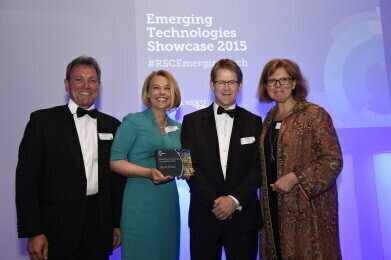-
 从左到右:RSC行业经理Steve Pleasance, Haemostatix的研究经理Renata Zbozien博士,多肽树突的发明者;Haemostatix的首席执行官本·尼科尔斯博士;Sherry Coutu CBE,连续创业家。Credit: Royal Society of Chemistry / MPP Image Creation
从左到右:RSC行业经理Steve Pleasance, Haemostatix的研究经理Renata Zbozien博士,多肽树突的发明者;Haemostatix的首席执行官本·尼科尔斯博士;Sherry Coutu CBE,连续创业家。Credit: Royal Society of Chemistry / MPP Image Creation
News & Views
Showcase Highlights Brightest Ideas to Industry Panels
Aug 17 2015
今年7月,来自欧洲各地的30名决赛选手面对面地向行业专家小组展示了他们关于最新医疗保健、能源和可持续发展以及材料技术的想法。
The Royal Society of Chemistry’s annual Emerging Technology Showcase, now in its third year, included small companies and academic entrepreneurs from nine countries outside the UK for the first time, including Denmark, Germany, Switzerland and the Netherlands. Diverse pitches included diagnostic flu tests using gold and sugars, electricity generation from wastewater and wearable energy harvesting fabrics, among many others.
总部位于诺丁汉的莱切斯特大学的分支机构Haemostatix公司,因其用于治疗手术和创伤出血的多肽树突状分子获得了医疗保健领域的一等奖。这种新一代化合物是基于纯合成的肽结构,与血液蛋白纤维蛋白原结合,形成纤维蛋白样凝块。它正在被开发用于不易接近的出血和穿透性创伤伤口,与目前的护理标准凝血酶(一种体积较大、相对脆弱的蛋白质)相比有许多优势。该公司的先导化合物PeproStat™目前正在英国四家医院进行肝脏手术临床试验。
Ben Nicholls, CEO of Haemostatix Ltd said: “This competition is highly competitive and prestigious so we are delighted to have been awarded first prize. To have the healthcare industry recognise the potential of this new technology is extremely positive and we hope that our compounds will go on to benefit patients in hospitals all over the world.”
In second and third place, were the University of Cambridge, for their cancer therapy using artificial metalloproteins, and CytoFind Diagnostics, for their picoliter droplets for detection of circulating tumour cells.
In the Energy and Sustainable category, it was Ghent University, Belgium, which won with its idea of a chemical pump for recovery of industrial waste heat. Second and third were also respectively taken by international winners in Danish InfinityPV, for their ultra-thin foil-based photovoltaic device, and the National Institute of Chemistry in Slovenia for novel catalysis for syngas production.
The University of Cambridge scooped the final first prize in Materials for its idea of metal-organic frameworks manufacturing technology for gas storage. Engineering functional materials for data communications was the idea behind the University of Leeds’ second place pitch. Bridgend’s Seren Photonics Ltd came third with GaN templates enabling next generation LED.
Each of the first prize winners won £20,000 and also tailored business support from the Society’s corporate partners. Second prize received £3,000 and third prize £2,000.
Events
ACS National Meeting & Expo, Fall 2022
Aug 21 2022Chicago, IL, USA & Online
Aug 22 2022Frankfurt, Germany
Aug 27 2022Maastricht, Netherlands
Aug 28 2022Lisbon, Portugal
Aug 31 2022Singapore



















